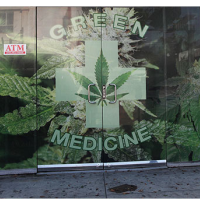L.A. Voters Restrict Pot Dispensaries, but the Medical Marijuana Fight Isn’t Over
 A medical marijuana dispensary in Los Angeles (photo: Monica Almeida, New York Times)
A medical marijuana dispensary in Los Angeles (photo: Monica Almeida, New York Times)
In theory, Los Angeles voters convincingly passed a measure on Tuesday that finally laid down the law on medical marijuana dispensaries and brought order to an embarrassing saga of social chaos and political ineptitude.
In reality, there’s a good chance not a whole lot has changed.
Voters, by a 63%-37% margin, approved Measure D, capping the city’s wild and wooly medical marijuana marketplace at 135 dispensaries. It is believed there are between 700 and 1,000 pot shops operating in the city, but no one is sure and the number could be considerably higher.
Any pot shop opened before 2007, when the city tried and failed to establish a moratorium, is grandfathered into the system by Measure D. The rest must close. The new ordinance also requires background checks of all managers and raises the pot sales tax from 5% to 6%.
Competing Measures E and F failed, although only F was considered a serious contender. It would have introduced new dispensary regulations, but not cap their numbers. It lost with just 40.9% of the vote.
The new law is expected to receive legal challenges. David Welch, an attorney with Angelenos for Safe Access (creators of Measure F), indicated his group would probably sue the city, on the theory that the 2007 cutoff is arbitrary and unfair. He said that many shops that opened after 2007 would stay open in defiance of the law.
But even if the city backs off strict enforcement of the ordinance or a legal challenge prevails, dispensaries deemed illegal by the new law might have to deal with the federal authorities. The U.S. Attorneys office has aggressively pursued dispensaries across the state since late 2011 because, while California has legalized medical marijuana, federal law criminalizes possession and sale of pot.
If the feds don’t act, the state Legislature still might. Competing bills are making their way through both houses in Sacramento. The Senate has passed SB 439, which clarifies state law to make it clear that dispensaries are, indeed, legal and that local law enforcement should leave them alone unless their jurisdictions pass restrictions on them.
Assembly Bill 473 would create the Division of Medical Marijuana Regulation and Enforcement within the Department of Alcoholic Beverage Control (ABC) to “regulate cultivation, manufacture, testing, transportation, distribution, and sale of medical marijuana.” A tangential piece of legislation, Senate Bill 289, ostensibly addresses drugged-driving with a zero-tolerance standard, but makes no exception for persons with a medical marijuana prescription.
Besides the legislative initiatives, myriad medical marijuana court cases are coursing through the legal system at local, state and national levels.
Like the famed Los Angeles smog, the marijuana haze has thinned a bit but not yet lifted from the city.
–Ken Broder
To Learn More:
Los Angeles Voters Approve Limiting Medical Marijuana Shops (by Alex Dobuzinskis, Reuters)
Medical Marijuana: L.A. Voters Approve Measure to Limit Number of Dispensaries to 135 (by Rick Orlov and Mariecar Mendoza, Los Angeles Daily News)
New L.A. Law on Medical Marijuana Shops Faces Hazy Future (by Kate Linthicum, Los Angeles Times)
L.A. Adds to Medical Marijuana Confusion, Puts Pot Dispensary Ban on Hold (by Ken Broder, AllGov California)
- Top Stories
- Controversies
- Where is the Money Going?
- California and the Nation
- Appointments and Resignations
- Unusual News
- Latest News
- California Forbids U.S. Immigration Agents from Pretending to be Police
- California Lawmakers Urged to Strip “Self-Dealing” Tax Board of Its Duties
- Big Oil’s Grip on California
- Santa Cruz Police See Homeland Security Betrayal in Use of Gang Roundup as Cover for Immigration Raid
- Oil Companies Face Deadline to Stop Polluting California Groundwater





